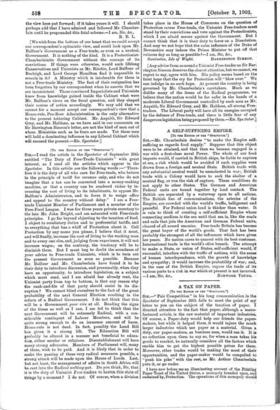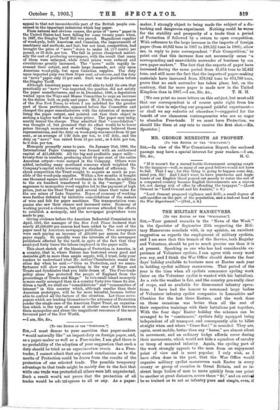A TAX ON PAPER.
[To THE EDITOR OF THE "SPECTATOR."] SIR,—" Fair Competition" in his long communication in the Spectator of September 26th fails to meet the point of my letter to you on the subject of the taxation a paper. I directed attention to the fact that paper, although a manu- factured article, is the raw material of important industries. Of course, a Paper-duty would help our friends the paper. makers, but while it helped them, it would injure the much larger industries which use paper as a material. Given a duty, our paper-makers, as business men, would use it. It is no reflection upon them to say so, for when a man takes his goods to market, be naturally considers all the factors which enable him to get the highest possible prices for them. Moreover, other trades would be making the most of their opportunities, and the paper-maker would be compelled to "push his pike" with the rest, as Mr. Arthur Chamberlain puts it, or go under.
I have now before me an illuminating account of the Printing Paper Trust of the United States, a monopoly founded upon, and sustained by, Protection. The operations of this monopoly should
appeal to that not inconsiderable part of the British people con- cerned in.the important industries which buy paper.
From natural and obvious causes, the price of "news" paper in the United States had been falling for some twenty years when, In 1897, the Dingley Tariff Bill was passed. Magnificent supplies of wood-pulp, both American and Canadian, the improvement of machinery and methods, and last, but not least, competition, had brought the price of "news" down to under 1d. (1.7 cents) per pound, or 35 dols, per ton. The fall in prices cheapened materi- ally the cost of producing newspapers, with the result that many of them were enlarged, while retail prices were reduced and circulations greatly increased. The " news " mills rapidly in- creased their output, and made large demands, not only upon American wood-pulp, but upon Canadian supplies. The duty upon imported pulp was then 10 per cent. ad valorem, and the duty on "news" paper only 15 per cent. Such was the position before the Dingley Tariff.
Although American paper was so well able to hold its own that practically no "news" was imported, the position did not satisfy the paper manufacturers, and so in December, 1896, a deputation waited upon the Ways and Means Committee to urge an increase in the duties both on pulp and paper. Mr. J. Norris, the manager of the New York Times, to whom I am indebted for the greater part of these particulars, appeared before the Committee and charged the paper manufacturers with the intention of monopo- lising the paper output, and pointed out that their object in seeking a higher tariff was to raise prices. The paper men indig- nantly denied the charge. They admitted that "consolidation" was thought of, but promised that its effect would be to lower prices through economies of working. Congress believed these representations, and the duty on wood-pulp was raised from 10 per cent., or an average of 1.20 dols. per ton, to 1.67 dols., and the duty on "news" was raised from 15 per cent., or 3 dols. per ton, to 6 dols. per ton.
Monopoly promptly came to pass. On January 31st, 1898, the International Paper Company was formed with an authorised capital of £11,000,000. All the big and profitable paper mills— twenty-four in number, producing about 80 per cent. of the entire American output—were merged in the Company. Others were added, including many moribund concerns which weighted the Company's capital while lowering its standard of efficiency. To check competition the Trust sought to acquire as much as pos- sible of the wood-pulp supplies. Within a few months it bought one thousand square miles of woodlands in the States, in addition to the six hundred transferred to it in the "merger?' This eagerness to monopolise wood supplies led to the payment of high prices, just as the Steel Trust paid several times their value for the ore mines of Lake Superior. Hopes of economy of working were further defeated by imitative consolidations of the makers of wire and felt for paper machines. The transportation com- panies also saw their chance and increased rates. Economy of working proved a chimera, but great success attended the efforts to establish a monopoly, and the newspaper proprietors were made to pay.
Giving evidence before the American Industrial Commission in April, 1901, the manager of the New York Times declared that nearly £1,000,000 per annum had been added to the cost of the paper used by American newspaper publishers. Two newspapers were each paying an increase of £30,000 per annum for their paper supply. So speedily were the interests of the newspaper publishers affected by the tariff, in spite of the fact that they employed forty times the labour employed in the paper mills.
This short sketch of the blessings of Protection in America, in a country, that is, where Nature has bestowed every good and desirable gift in more than ample supply, will, I trust, help your readers to understand what Mr. Arthur Chamberlain meant the other day when he said:—" Give us Protection, and we manu- facturers will show you something in the way of Rings and Trusts and Syndicates that you little dream of. The Free-trade policy alone has protected the people of England from the proceedings of Trusts and Rings." In this small island monopoly is more easily arranged than in a country forty-two times its size. Given a tariff, we shall see "consolidations" and "communities of interest" in this country which, although smaller than their American prototypes, will be far more harmful, because better able to control all the factors of the situation. Let those news- papers which are lending themselves to the advocacy of Protection ponder the single case of the American Paper Trust, an organisa- tion which is the type of scores of similar ones which between them monopolise and abuse the magnificent resources of the most favoured part of the New World.



























































 Previous page
Previous page